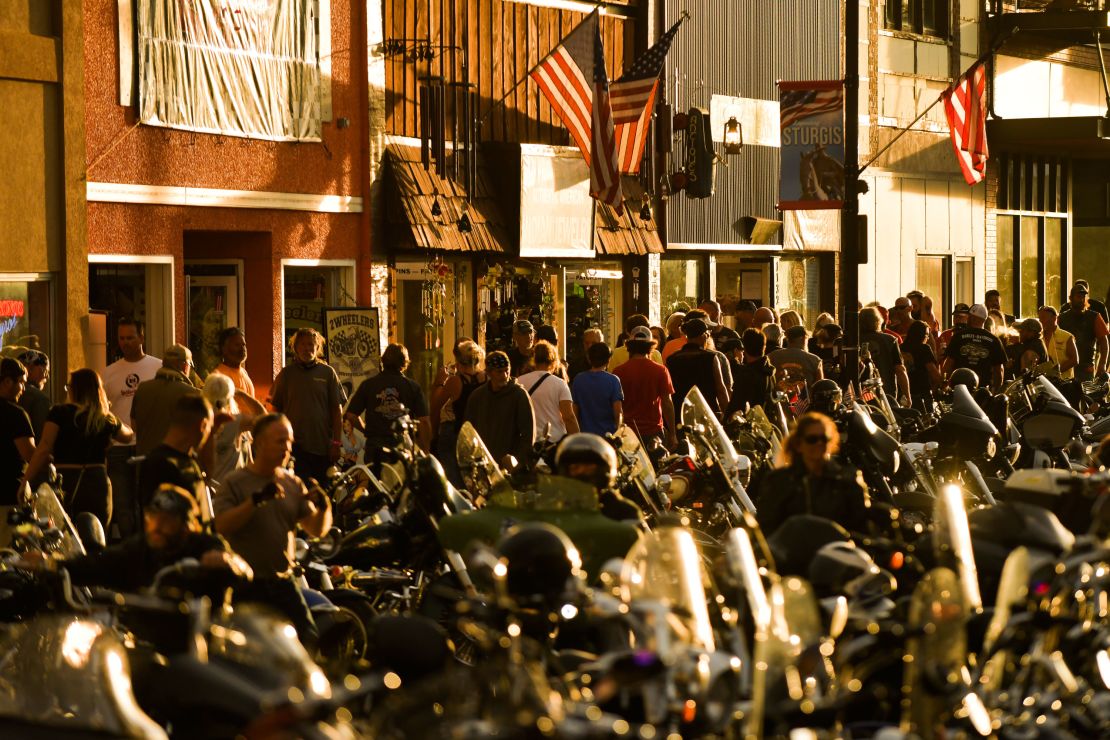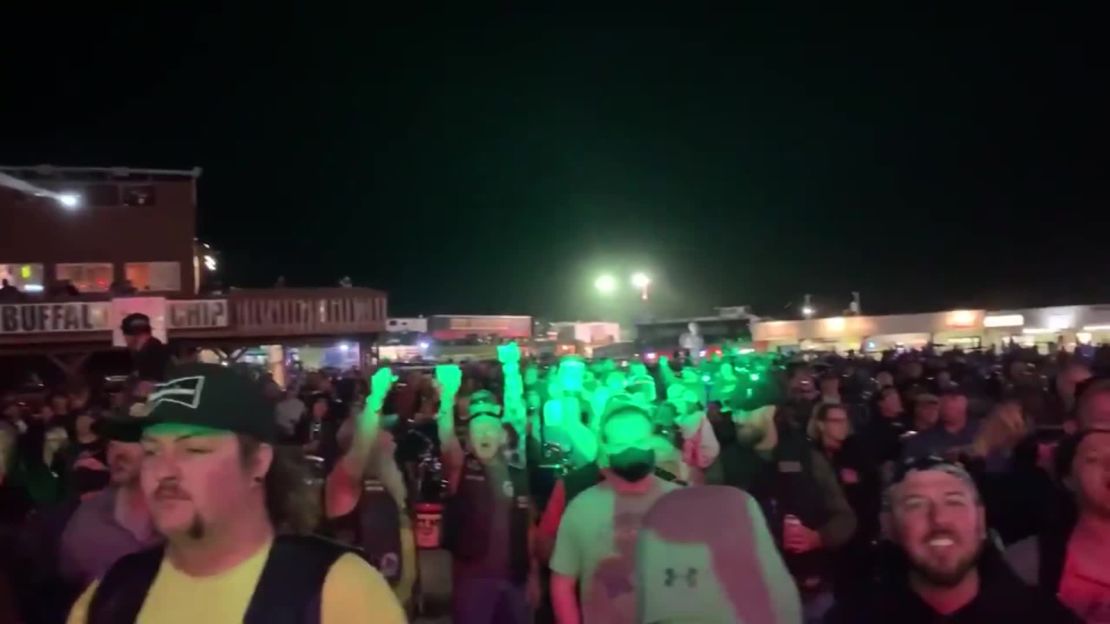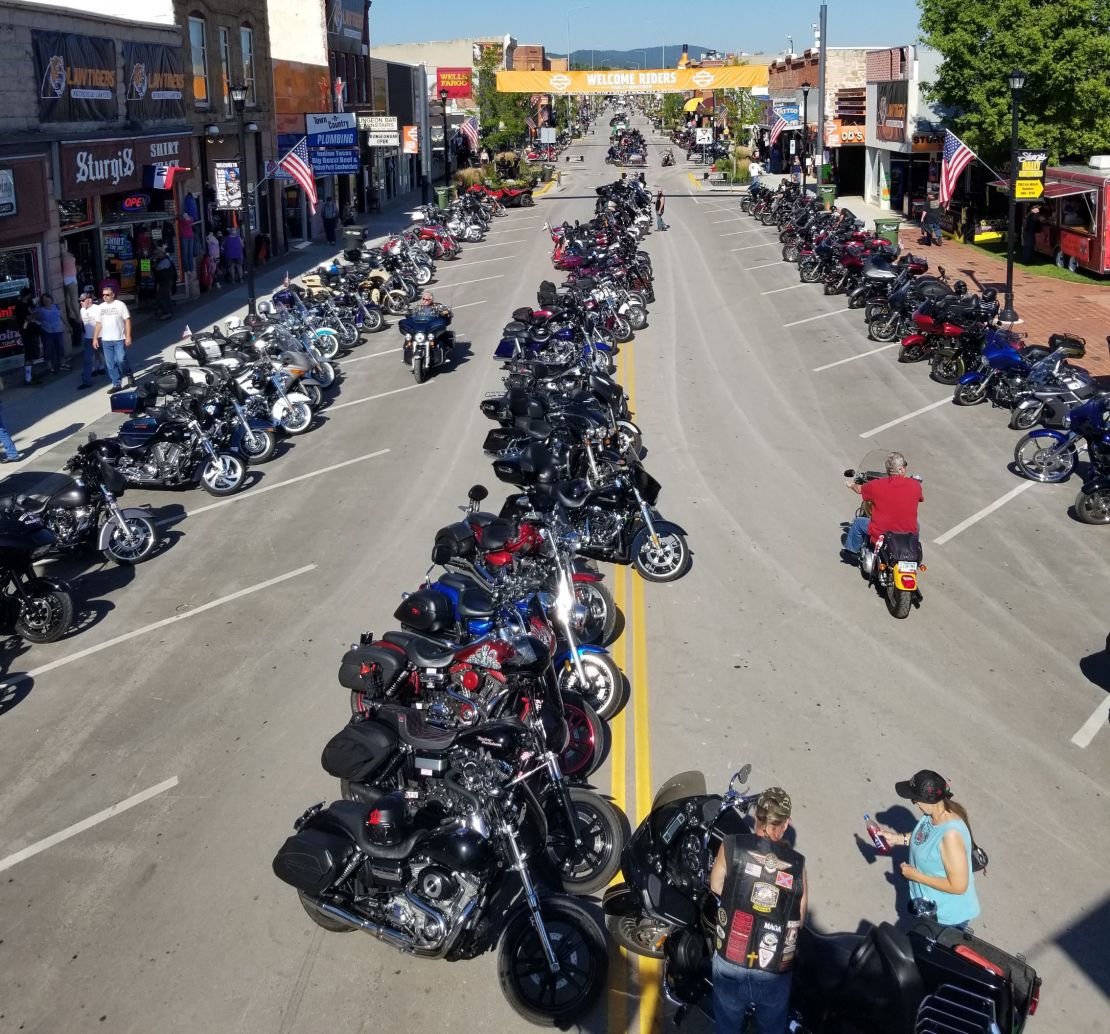Duston Van Balen took a road trip with his family and a wooden urn containing the ashes of a man he considered a brother, with stops at the Grand Canyon in Arizona and Zion National Park in southwest Utah.
It’s been nearly a year since Albert Aguirre, 40, was found dead at his home in Vermillion, South Dakota, and Van Balen’s long excursion this week was a celebration of his longtime friend’s free spirit and love for the outdoors.
But Van Balen will not be stopping at South Dakota’s annual Sturgis Motorcycle Rally, which Aguirre attended about a month before his September 10 death from what authorities listed as Covid-19.
“Too much of a risk,” Van Balen, 42, said of the rally, which was attended by 460,000 people in 2020 in what infectious disease experts likened to “a superspreading event.”
An even larger crowd from around the country is expected for this year’s 10-day event – which started Friday – as concerns mount over the highly contagious Delta variant.
“It’s definitely a cautionary tale,” Van Balen said of his friend’s death.
In South Dakota, where 59% of the population has received at least one dose of the coronavirus vaccine, the health department reported 52 cases per day in the past week – a 68% spike from the 31 cases per day the previous week.
Aguirre’s friends aren’t entirely sure where he got sick. After the rally, he took a trip to Oklahoma and had gone out in the college town where he lived alone. But they wonder whether he would still be alive had he avoided the Sturgis rally’s crowded bars and packed concerts where few revelers wore masks or kept a distance from others.
‘Everybody wants to be free’
Steve Sample, a 67-year-old land surveyor from Arizona, will be attending the 81st annual Sturgis rally. It’s his fifth straight year, and he will be there with his wife, who is vaccinated against Covid-19, he said. He is not.
“I’m going to go every year until I die, whether Covid kills me or a head-on collision,” he said. “That’s the way I am.”
A report by infectious disease experts from the US Centers for Disease Control and Prevention and South Dakota health officials traced 649 Covid-19 cases around the country and at least one death to the 2020 rally. The report said the “true national impact” of the rally on the pandemic is likely underestimated.

“The Sturgis rally had many characteristics of a superspreading event: large crowds, high intensity of contact between people, potential for highly infectious individuals traveling from hotspots, and events in poorly ventilated indoor environments,” the report said.
Another CDC report linked the rally to a Covid-19 outbreak in Minnesota, where at least 51 residents who attended the event became sick, and another 35 people were infected after coming into contact with a person who went to the rally. Those 35 people were household, social and workplace contacts, it said.
Of those 86 cases, four people were hospitalized, and one died, according to the report.
In early September, Minnesota’s health department identified the Covid-19 death from the rally. A spokesman for the department said the person was in their 60s, had been hospitalized in the ICU and had underlying health conditions.
“I didn’t see one mask on anybody and I was there for 10 days,” Sample said. “Everybody wants to be free.”
‘There’s a risk associated with everything’
While the last rally went on despite opposition from local residents, Sturgis City Manager Daniel Ainslie said this summer there was no pushback.
“We continue to encourage people that if they don’t have immunity and if they’re in a high-risk category that it’s probably not wise for them to come,” he said. “And we definitely don’t encourage people who have several high-risk categories to attend.”
Sturgis, the South Dakota Department of Health and Monument Health announced this week that Covid-19 self-test kits will be made available to rally participants. Additionally, Ainslie said, hand sanitizing stations have been set up in downtown Sturgis for months.
South Dakota has placed few restrictions on businesses during the pandemic and, at the last rally, there were no state, county or city mask mandates in effect, according to the CDC report.
The state has had 14,197 cases per 100,000 people, joining North Dakota and Rhode Island with the highest rates in the nation.

Even as cases surged in her state last November, Republican Gov. Kristi Noem refused to mandate masks or put in place measures that many other governors took to slow the spread. She insisted her state had been most effective by swiftly identifying and isolating cases
The governor’s a strong supporter of the rally, saying that to hold events like it, people should be given information that lets them protect their health but still enjoy their way of life.
Noem, who recently criticized fellow GOP governors who enacted Covid-19 measures, is expected to attend a rally charity ride on Monday, according to the website of the Sturgis Buffalo Chip campground.
“The Sturgis rally is about hopping on your bike and exploring this great country through our open roads,” Noem said via Twitter on Wednesday.
“Bikers come here because they WANT to be here. And we love to see them! There’s a risk associated with everything that we do in life. Bikers get that better than anyone.”
‘You need less time breathing that air to become infected’

The rally means big money for the local economy, generating more than $500 million in sales each year in South Dakota, according to Ainslie. It includes drag races, charity rides, rock concerts, pub crawls, tattoo contests and processions of Harley-Davidsons through the Black Hills mountain range. A popular T-shirt last year read, “Screw COVID. I went to Sturgis.”
“People come here because they’re free of all that unnecessary political government control exercised over their lives,” said Rod Woodruff, owner of the Sturgis Buffalo Chip campground about three miles outside the city.
Woodruff said he was not aware of a single Covid-19 case traced back to the rally.
“All these people here … know all the crap, all the baloney that has gone back and forth about how dangerous all this unseen stuff is and the viruses,” he said. “Everybody’s aware of all that and they have assumed the risk of getting out of their home and getting away and going someplace else and hanging out with people that are like-minded.”
Indeed, the dangers of cramming thousands of people into tight venues are well known. The CDC even changed its guidance last week to recommend that vaccinated people wear masks indoors again.
The dangerous Delta variant has fueled the country’s latest surge and infectious disease experts warn that if more Americans don’t get vaccinated and wear masks, the country could soon see several hundred thousand cases a day.
“People often associate with Sturgis being outdoors on the bike,” said Dr. Michael Osterholm, director of the University of Minnesota’s Center for Infectious Disease Research and Policy.
“That makes it hard to imagine why there would be an increased risk of potential COVID transmission. But it’s what is done in Sturgis. It’s indoors, in the bars. It’s in the tattoo parlors. It’s in all the inside activities that really put people at increased risk.”

Osterholm pointed to the July Fourth celebration that brought thousands of visitors from across the country to the small town of Provincetown, Massachusetts, for parties and festivities in Cape Cod.
A CDC study published last week said 469 Covid-19 cases were identified in Massachusetts residents who had traveled to Barnstable County – which includes Provincetown – between July 3 and July 17. The cases were associated with “multiple summer events and large public gatherings,” the CDC said.
Roughly three-quarters of Provincetown cases were among fully vaccinated people, a finding that suggested inoculated people can also spread the virus, including the Delta variant. The findings persuaded the CDC to change its face mask guidelines.
Osterholm said any inside activities involving crowds put people at risk.
“That means that you need less time breathing that air to become infected yourself,” he said. “So that even now what might have been a 15-minute exposure indoors in a given environment may now only be five minutes.”
After returning home to Vermillion from the August 7-16 Sturgis rally and a trip to Oklahoma, Aguirre was found dead at home in September, according to friends and Clay County Sheriff Andy Howe.
The sheriff said authorities don’t know how and where Aguirre contracted Covid-19. No autopsy was performed after a posthumous test came back positive for the virus, Howe said.
“Since it came back positive that’s what we determined the cause of death to be,” Howe said, referring to Covid-19.
Van Balen and other friends suspect Aguirre became ill at Sturgis. Some had even urged him to stay away.
“We tried to caution him: Maybe don’t go this year. Or if you go, wear your mask,” Van Balen recalled as he celebrated his friend’s life with a final road trip. “But he was living his life. It frustrated a lot of us. He wasn’t one of the lucky ones.”



